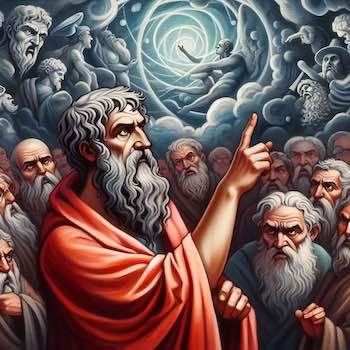Through the ‘Microreflections’
Alexandre Lacroix’s excellent ‘Microreflections’ conceals a particular nugget: ‘To put an end to the original sin of philosophy’. Alexandre presents ideals as the deities of an inaccessible world tyrannizing thought. The mind would only use a degraded version of it, and whoever observes this mind would only see the even more degraded image. Ideals perverted by their transmission. Approaching their perfection is only possible in direct contact, in the secret of one’s mind.
This is the idealistic tradition stemming from Plato, still taught. Alexandre criticizes it, rightly, because it inferiors reality, gives it the status of a waste disposal of the world of ideals. For my part, I see a close link with a mental incompleteness, which reverses the position of the idealist. He is no longer the one who accesses a higher reality, but who has failed to build it in himself.
In the mental cogs
Here is the neuro-functional explanation. You know, having read Stratium, that the mind is a pyramid of concepts patiently woven by neural networks from the sensory base. Each level forms its own stability, is sought in the impulses that reach it, participates in a higher stage of mental integration with other concepts of the same level. Thus is built an increasingly recognizable personality, and not a mind entirely formatted by daily external signals.
The mind emancipates itself from sensory reality. It builds alone its ‘world of ideals’, in fact its personal reality. It must connect it to others, using mimicry and languages, to make it consensual. It becomes ‘objective human reality’, at least one of its innumerable versions.
Incomplete weaving
Some people experience immense difficulties in this task. The reasons are largely neurophysiological. Establishing the final conscious synthesis of this edifice requires a particular variety of neurons (so-called pyramidal), long pathways through the entire brain, and functional neuro-hormonal metabolism. Fragile mechanisms sometimes altered by genetic mutations, psychotropic drugs or traumatic micro-lesions. Psychoses or borderline states. The final weaving does not take place. The lid does not close on effective conscious integration. Superior concepts retain their independence. For the spirit that hosts them, they are plato’s divine ideals.
Not surprisingly, those who profess the greatest attachment to idealistic philosophy are generally accused of ‘madness’ by others. Poets, prophets, pamphleteers, dictators, gurus. Some force admiration. Volcanoes of imagination, geysers of ideas. But the reality is not that they have more original thoughts. Rather, it is that they do not control them. They do not chain them to the rest of the consensual reality. These thoughts are delivered raw.
When a madman’s mental output is low located in the conceptual pyramid, he is considered simple-minded, no matter how original his discordant thoughts are. If the madman has managed to raise his intelligence to heights that are beyond us, he becomes a genius. Incoherent despite everything in consciousness, he can die of a stupid accident. Idealists willingly have a comet destiny, one that ends up scarring on the hail face of the Moon.
The fatal trap is to transfer ideals to a higher world
Open door to dogmatism. The mind applies one of its autocratic concepts, of which it is the sole owner, to the whole of reality. The alibi of divine origin serves to force its congeners to apply it. All despots come from idealism. They claim the divine right to persecute and coerce.
Introversion is not immune. The introverted idealist enslaves his own mind. Some superior concepts impose silence on others. The reflection of the idealist is not a debate of ideas but a gospel. His mind will have to refer, ultimately, to the Tables of the Law.
Handling idealistic philosophy
Idealistic philosophy is not harmful if it is an idealism of our own mind. We can be amazed at the boiling of which it is capable. There is no danger in letting the most aberrant thoughts wander in conscious space… as long as it is densely inhabited. Illusions, follies and absurdities will meet their antonyms. From this congress emerges a project coherent with the outside world. Its originality is not weakened, only formatted.
Sometimes consciousness is a jailer. No thought is free. It comes to discuss at the parlour with the outside. Everything is listened to. The idealist is the opposite: not only is there no jailer, but consciousness does not exist. The mind is in direct contact with the world of ideals. Thoughts fall from the sky and impose themselves on reality, which must kneel.
Rather than a policeman or a divine window, let us see our consciousness as a jurist. Perpetually thickening its jurisprudential encyclopedia. But also able to signal when an idea is not part of it. It is free to go out. That It tries to reach fame.
It is up to us to send them to the Pantheon, to stretch the chains of those we have already found there.
*

